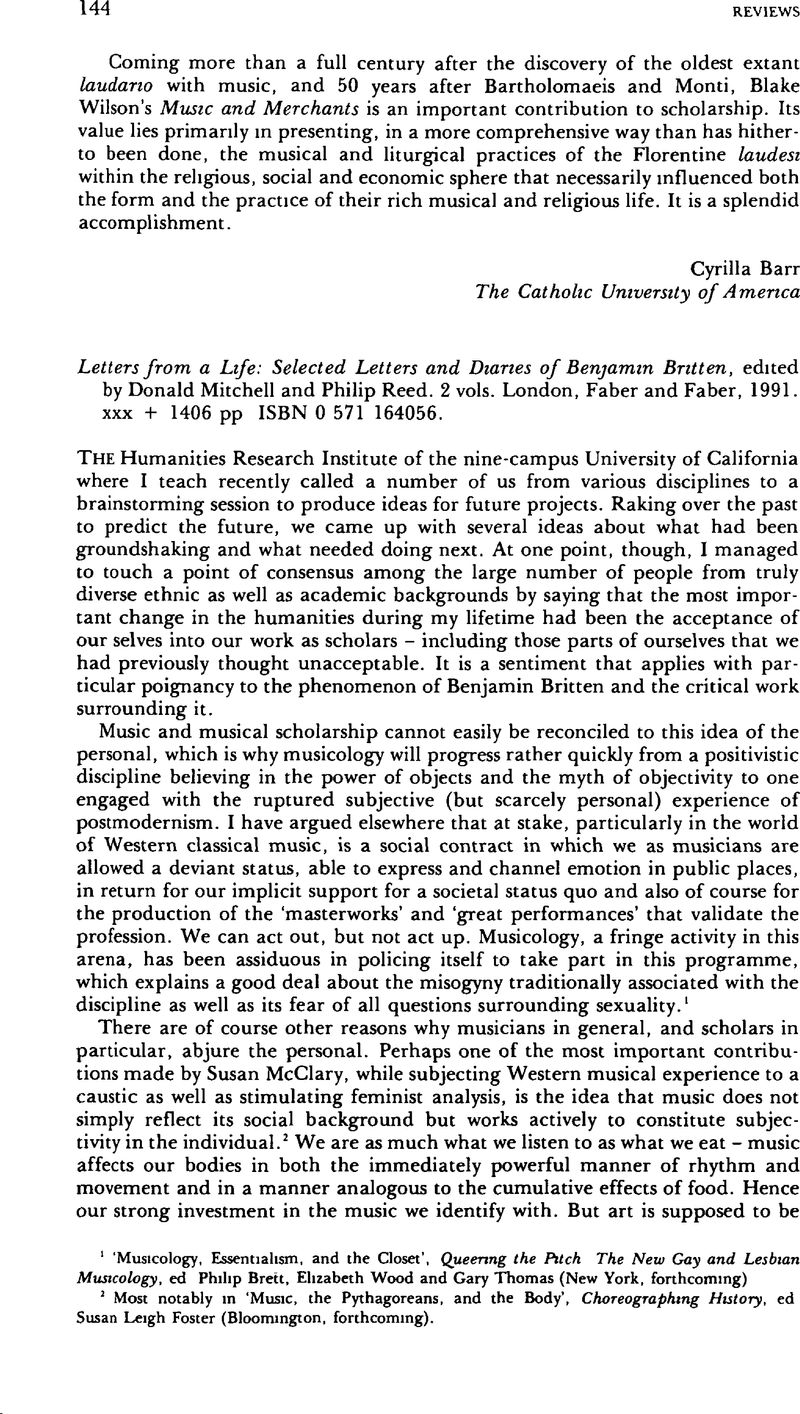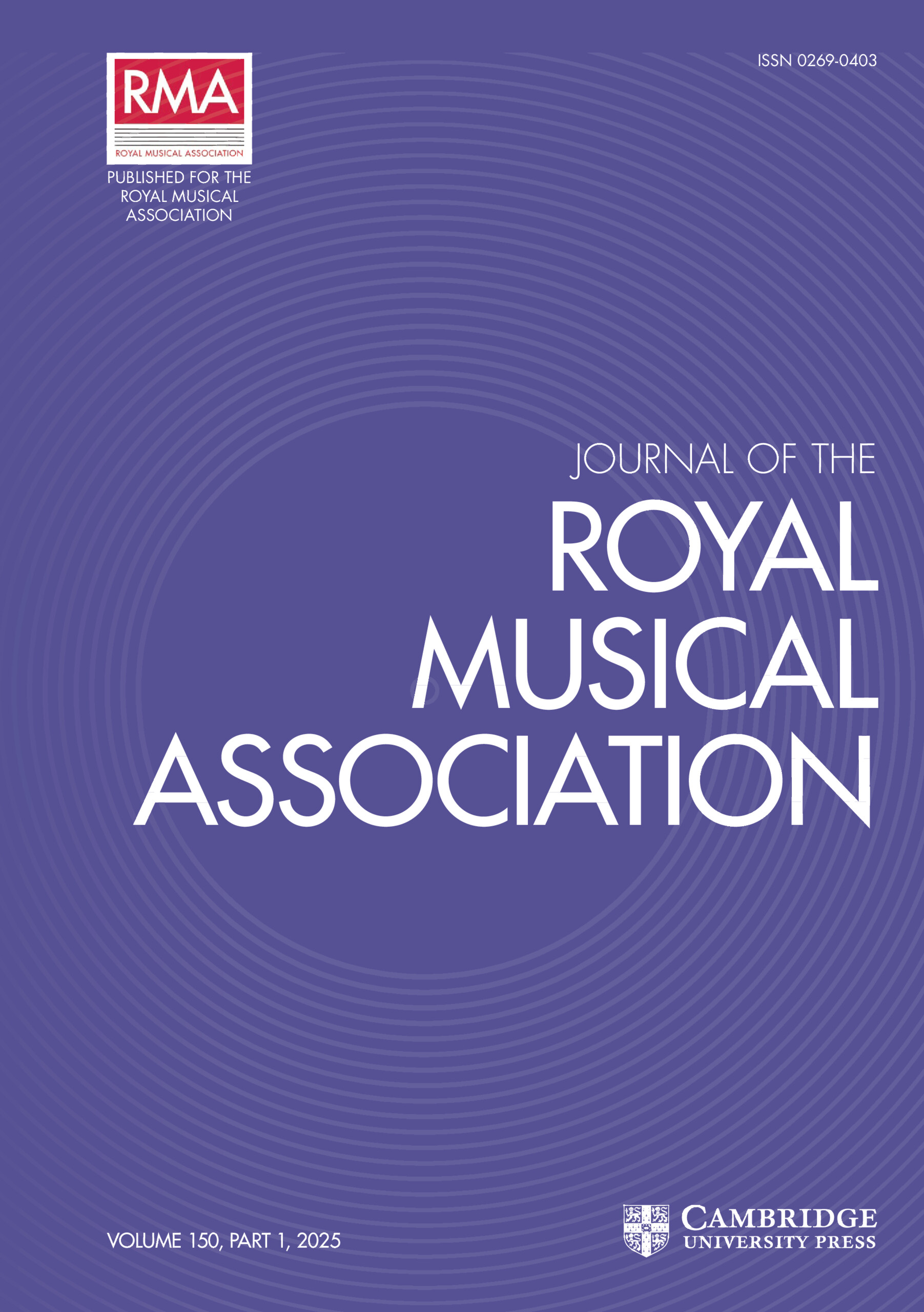No CrossRef data available.
Article contents
Letters from a Life: Selected Letters and Diaries of Benjamin Britten, edited by Donald Mitchell and Philip Reed. 2 vols. London, Faber and Faber, 1991. xxx + 1406 pp ISBN 0 571 164056.
Review products
Published online by Cambridge University Press: 01 January 2020
Abstract

- Type
- Reviews
- Information
- Copyright
- Copyright © 1994 Royal Musical Association
References
1 ‘Musicology, Essentialism, and the Closet’, Queering the Pitch The New Gay and Lesbian Musicology, ed Philip Brett, Elizabeth Wood and Gary Thomas (New York, forthcoming)Google Scholar
2 Most notably in ‘Music, the Pythagoreans, and the Body’, Choreographing History, ed Susan Leigh Foster (Bloomington, forthcoming).Google Scholar
3 Forster, E. M., Howards End (Harmondsworth, 1941), 219Google Scholar
4 ‘Defining Music’, MLA Notes, 43 (1986–7), 751–66Google Scholar
5 Gallop, Jane, ‘The Immoral Teachers’, Yale French Studies, 63 (1982), 117–28 (p 118), see also Juliet Flower MacCannell, ‘Resistance to Sexual Theory’, Theory/ Pedagogy/Politics Texts for Change, ed Donald Morton and Mas'ud Zavarzadeh (Urbana, 1991), 64–89 (pp 74–7) Examining the implications of this ‘heterosexual pederasty’, Greg Bredbeck argues that the pedagogic condition ‘always changes the sexual difference of the pederastic ur-scene into sexual in difference’, and thus erases women see ‘Anal/yzing the Classroom On the Impossibility of a Queer Pedagogy’, Professions of Desire, ed George Haggerty and Bonnie Zimmerman (New York, forthcoming)Google Scholar
6 Sedgwick, Eve Kosofsky, Epistemology of the Closet (Berkeley, 1990), 56–7Google Scholar
7 See his ‘appreciation’ of Nadia Boulanger, his composition teacher, reprinted in Women in Music, ed Carol Neuls-Bates (New York, 1982), 240–2Google Scholar
8 Miller, David A, The Novel and the Police (Berkeley, 1988), 206–7Google Scholar
9 Carpenter, Humphrey, Benjamin Britten A Biography (London, 1992), Christopher Headington, Peter Pears A Biography (London, 1992)Google Scholar
10 West, Donald J, Homosexuality Re-examined (London, 1977, 4th edn of Homosexuality, London, 1955), 211–15Google Scholar
11 Vol i, Introduction, trans Robert Hurley (New York, 1978)Google Scholar
12 See Sedgwick, , Epistemology of the Closet, esp pp 67–75 For an analysis of the Britten letters along these lines see the review by Byron Adams, MLA Notes, 49 (1992–3), 1406–8Google Scholar
13 Carpenter, Benjamin Britten, 335Google Scholar
14 A standard history of this era is Harford Montgomery Hyde, The Other Love An Historical and Contemporary Survey of Homosexuality in Britain (London, 1970), published in North America as The Love that Dared Not Speak its Name A Candid History of Homosexuality in Britain (Boston, Mass, 1970), 212–28 For a literary perspective, see Smfield, Alan, Literature, Politics and Culture in Postwar Britain (Berkeley, 1989), Chapter 5.Google Scholar
15 Hodges, Andrew, Alan Turing The Enigma (New York, 1983), 455–87 (Turing's arrest and death) and 496–527 (a thoughtful account of the era), the reference to Britten is on p 519Google Scholar
16 The remark is quoted by Martha Nell Smith in ‘Sexual Mobilities in Bruce Springsteen. Performance as Commentary’, Present Tense Rock & Roll and Culture, ed Anthony DeCurtis (Durham, NC, 1992), 197–218 (p 204), from Dave Marsh, Glory Days Bruce Springsteen in the 1980s (New York, 1987), 216, in the context of a discussion of Springsteen's ‘blatant homoeroticisms’ Possibly pertinent here is Smith's point that the representation of lesbian and gay couples ‘as part of a photomontage of all-American lovers’ in the music video ‘Tougher than the Rest’ is ‘in contrast to Bowie- or Jaggeresque flamboyance’ (p. 210) the strong drag and music-hall vaudeville tradition in England always confused gender and sexuality issues in a way that encouraged either ‘flamboyance’ or its oppositeCrossRefGoogle Scholar
17 Letters from a Life, ed. Mitchell and Reed, p 817, quoting Aaron Copland and Vivian Perlis, Copland 1900 through 1942 (London, 1984), 213 The open secret has no regard for economy in its euphemistic designationsGoogle Scholar
18 Mitchell, Donald, ‘What do we Know about Britten Now?’ and ‘Catching on to the Technique in Pagoda-Land’, The Britten Companion, ed Christopher Palmer (London, 1984), 39–45 and 192–210 Mervyn Cooke, ‘Oriental Influences in the Music of Benjamin Britten’ (Ph D dissertation, University of Cambridge, 1988), ‘Britten and the Gamelan: Balinese Influences in Death in Venice’, Benjamin Britten Death in Venice, ed Donald Mitchell (Cambridge, 1987), 115–28, and ‘Britten and Bali’, Journal of Musicological Research, 7 (1988), 307–39.Google Scholar
19 More information is admittedly now available in Carol Oja, Colin McPhee Composer in Two Worlds (Washington, DC, 1990), available only in dissertation form earlier (Graduate School of the City University of New York, 1985)Google Scholar
20 Postmarked 10 July 1941 and written from Yaddo, near Saratoga, New York (bold letters printed with the red ribbon of the typewriter) Britten had put McPhee in touch with David Ewen, who proposed to include Britten in a study of modern composers he was editing (see letter 309) According to a further letter of McPhee's to Elizabeth Mayer, on 30 October ‘Ewen's book has been given up, and I am glad, for though I hope to publish something about Ben, in the same tone, I would like to develope [sic] it more The other thing was too hasty‘Google Scholar
21 Griffiths, Paul, ‘A Mind Withdrawing. Britten's Music and the Lure of Might-Have-Beens’ (review of Letters from a Life), The Times Literary Supplement, 4604 (28 June 1991), 14–15Google Scholar
22 Keller, Hans, ‘Introduction Operatic Music and Britten’, The Operas of Benjamin Britten, ed David Herbert (New York, 1979), xxvi, Maynard Solomon, ‘Franz Schubert and the Peacocks of Benvenuto Cellini’, 19th Century Music, 12 (1988–9), 193–206, Andreas Mayer, ‘Der psychoanalytische Schubert. Eine kleine Geschichte der Deutungskonkurrenzen in der Schubert-Biographik, dargestellt am Biespiel des Textes “Mein Traum”’, Schubert durch die Brille, 9 (1992), 7–31, Rita Steblin, ‘The Peacock's Tale Schubert's Sexuality Reconsidered’, 19th Century Music, 17 (1993–4), 5–33 – this issue also contains Solomon's response and a number of other articles and commentaries on the matterGoogle Scholar
23 See, for example, his essay in Benjamin Britten Billy Budd, ed Mervyn Cooke and Philip Reed (Cambridge, 1993), 111–34Google Scholar
24 In an interview with John Evans, Peter Pears made the point that it was Owen Wingrave that shocked people, not Death in Venice, see ‘Benjamin Britten's Death in Venice Perspectives on an Opera’ (Ph D dissertation, University College, Cardiff, 1983), 335Google Scholar




